Overview
Have you ever wondered how integrating B2B eCommerce ERP systems could transform equipment manufacturing? Well, this article shines a light on ten fantastic benefits of such integration that can truly make a difference. We're talking about:
- Improved operational efficiency
- Enhanced customer experience
- Significant cost savings
Each of these benefits is backed by solid data and real-life examples, showing how this integration not only streamlines processes but also helps businesses grow and adapt in a competitive market. So, let's dive in and explore how these advantages can work for you!
Introduction
The landscape of equipment manufacturing is changing fast, and digital solutions are becoming a must-have for success. Have you ever thought about how B2B eCommerce ERP systems can help manufacturers streamline operations, make better decisions, and enhance customer experiences? It’s a powerful tool! But as companies dive into this integration, they often wonder: how can they use these systems not just to boost efficiency but also to drive growth in a competitive market?
Exploring the many benefits of B2B eCommerce ERP opens up a world of opportunities. These systems can truly transform operational capabilities and redefine what success looks like for manufacturers. So, are you ready to discover how these solutions can work for you?
GenAlpha Technologies: Streamline Operations with B2B eCommerce ERP Integration
At GenAlpha Technologies, we’re all about crafting tailored solutions for B2B eCommerce ERP integration that help producers really amp up their operations. Imagine seamlessly merging Equip360 with your existing ERP platforms—this means you can automate your sales processes, boost your inventory management, and enhance customer interactions all at once! Not only does this integration streamline your operations, but it also lets you focus on what you do best, significantly ramping up your efficiency and responsiveness to market demands.
Did you know that companies that combine ERP solutions with eCommerce platforms see a whopping 30% drop in operational expenses and a 35% reduction in delays? That’s the kind of transformative effect we’re talking about! Take Robert Lee, for instance; his success story showcases how producers can enhance their operational capabilities. His clients have reported better customer satisfaction and increased sales efficiency.
And here’s a thought to ponder: as Forrester highlights, "73% of B2B purchasers now expect the same level of personalization in B2B engagements as they do in B2C settings." This really underscores the importance of optimizing your operations through B2B eCommerce ERP solutions to stay competitive in today’s fast-paced market. Plus, companies that embrace ERP-driven scalability have reported expanding into new markets 22% faster. Isn’t that an exciting growth potential? So, what do you think? Are you ready to take your operations to the next level?
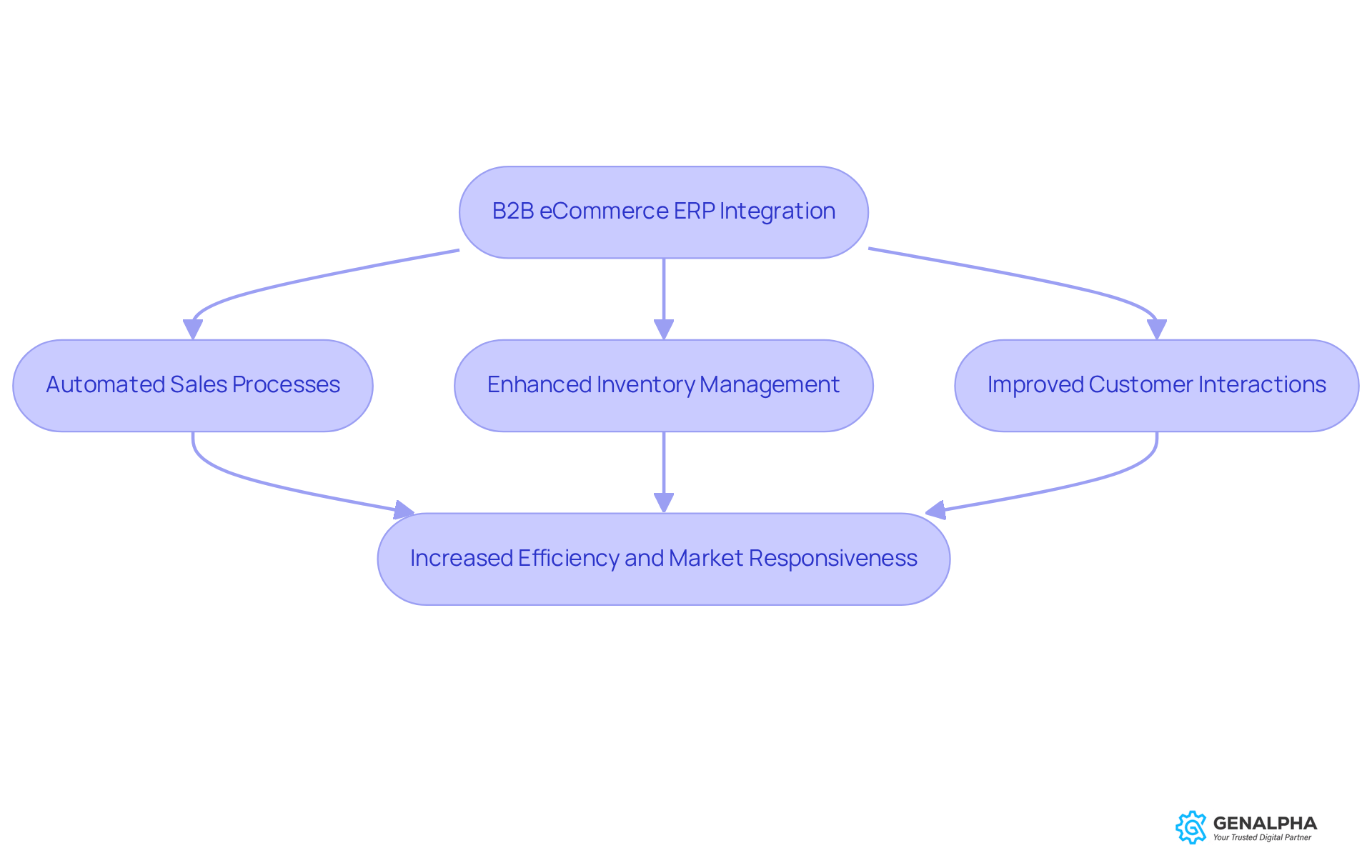
Real-Time Data Access: Enhance Decision-Making for Manufacturers
Imagine having real-time access to crucial data right at your fingertips. Integrating b2b ecommerce erp systems enables producers to make quick and informed decisions. This means businesses can easily adapt to market changes, manage supply chain hiccups, and tweak production schedules on the fly. For example, when producers have prompt visibility into inventory levels, they can dodge stockouts and overstock situations, which really boosts operational efficiency and keeps customers happy.
Did you know that 74% of producers see real-time data as vital for their operations? It gives them a complete picture of production processes and how everything connects. Plus, 80% of IT leaders in manufacturing report seeing a 2-5 times ROI or even more from investing in data streaming. That’s a solid reason to consider real-time data access!
Companies embracing smart data strategies are noticing immediate efficiency gains. Engineering teams are now focusing on predictive maintenance, continually enhanced through machine learning to catch equipment failures before they occur. Meanwhile, supply chains are becoming more responsive. By tapping into real-time insights and exploring strategies like the hybrid edge-to-cloud model, manufacturers can not only streamline their operations but also elevate their decision-making processes. This leads to greater profitability and competitiveness in the market. So, are you ready to take your operations to the next level?
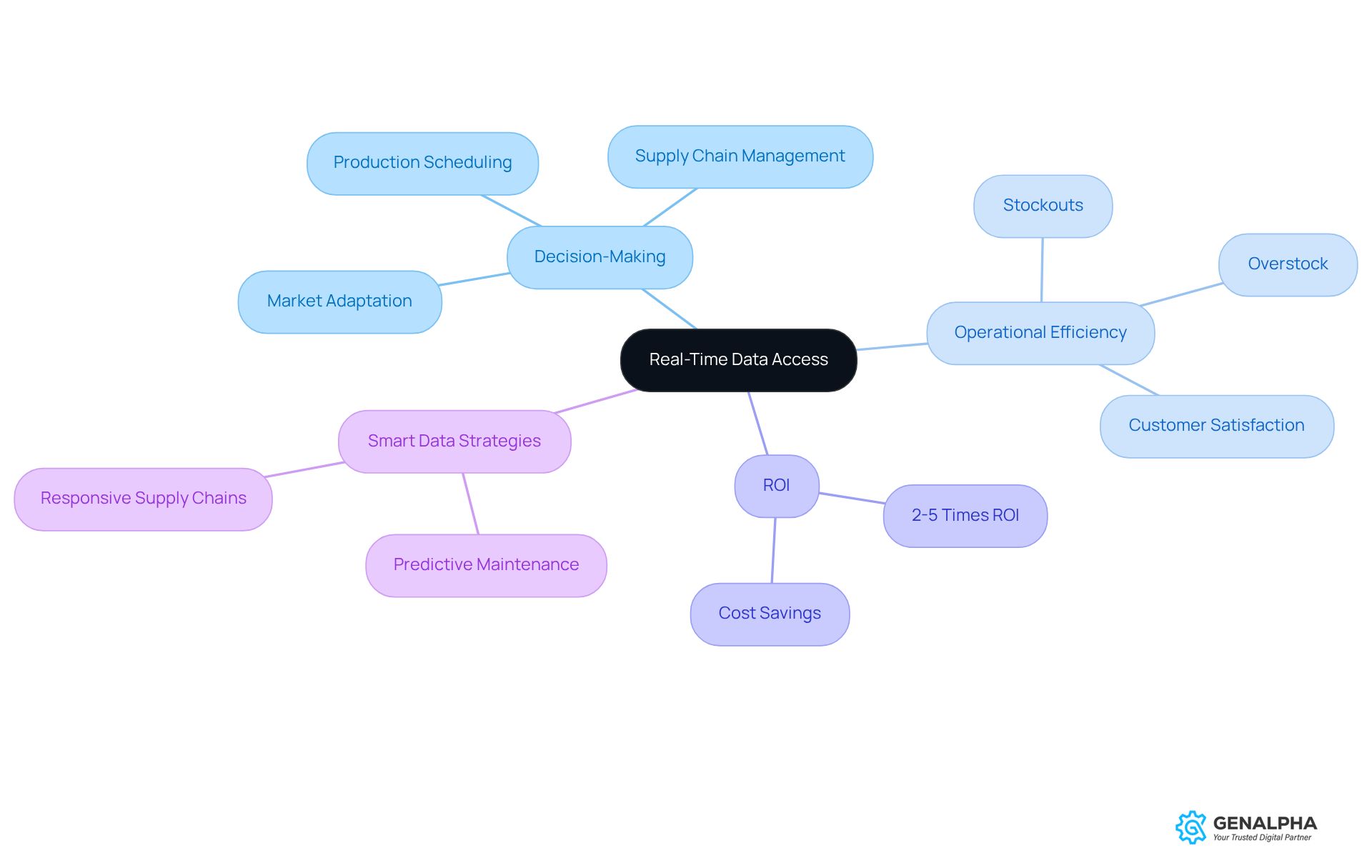
Improved Order Accuracy: Boost Fulfillment Efficiency for Manufacturers
Integrating b2b ecommerce erp systems can significantly enhance order accuracy, right? By automating data entry and cutting down on those manual processes, businesses can significantly reduce errors in order fulfillment. And we all know how critical that is for building customer trust and satisfaction! For example, when orders are processed automatically, the right products get shipped out, which means fewer returns and a smoother fulfillment experience overall. This allows manufacturers to raise their service levels and improve operational performance.
Companies that have jumped on board with these automated systems have reported cutting their order processing time by up to two-thirds, according to IBN Technologies. That’s a game changer! Plus, structured automation doesn’t just streamline workflows; it also enhances communication between teams, leading to better customer experiences.
But let’s be real—producers often face challenges like limited inventory visibility and rising fulfillment costs. Thankfully, b2b ecommerce erp can provide automated solutions to tackle those issues head-on. As a specialist from IBN Technologies puts it, 'Sales Order Processing Automation is emerging as a vital competitive edge.' So, in today’s market, embracing these solutions is more important than ever. What do you think? Are you ready to explore how automation can transform your operations?
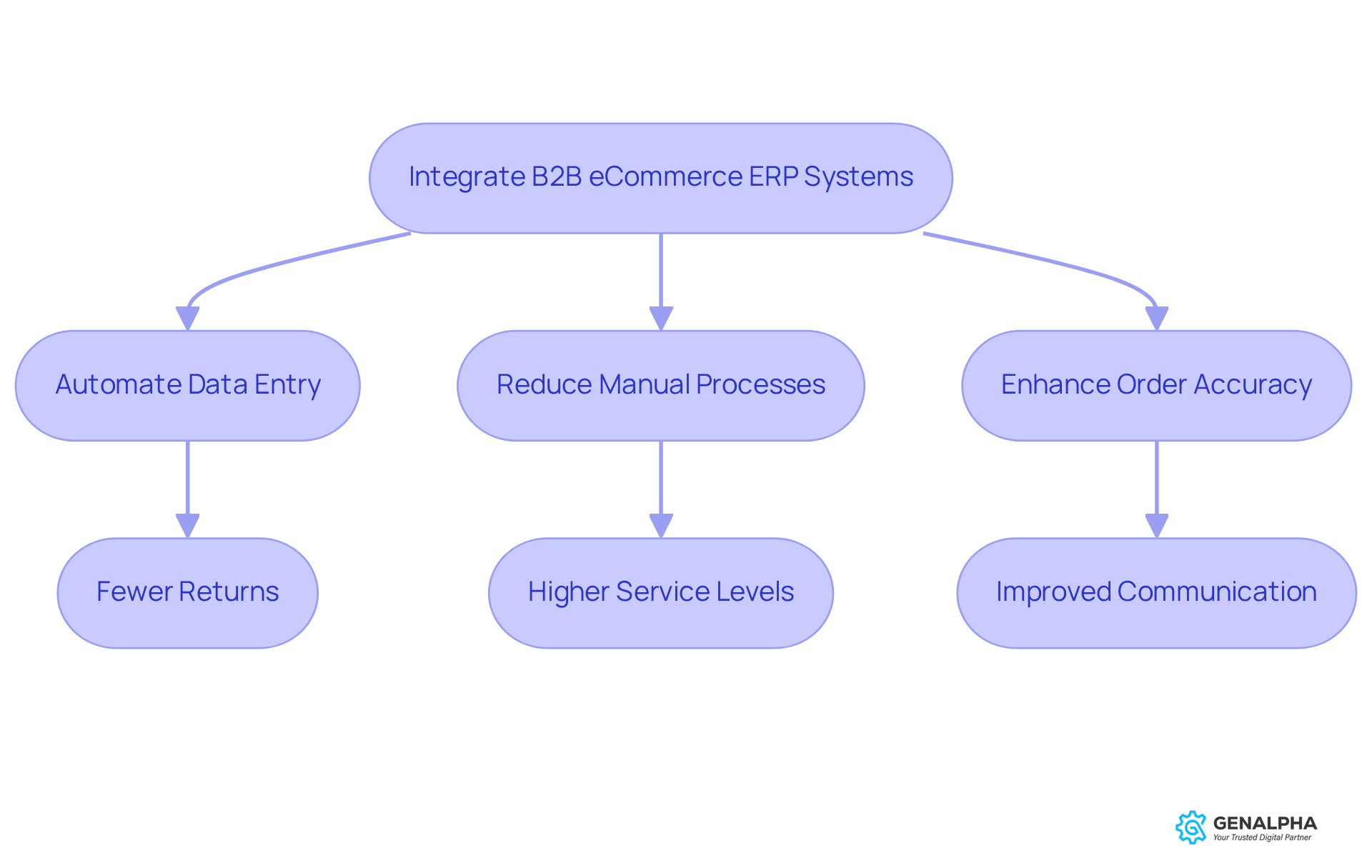
Enhanced Inventory Management: Optimize Stock Levels and Reduce Costs
Incorporating b2b ecommerce erp solutions is a game changer for producers looking to boost their inventory management. Imagine having real-time insights into stock levels and demand predictions at your fingertips! This capability is crucial for keeping inventory at optimal levels, which helps reduce carrying costs and lowers the risk of stockouts. For example, automated inventory monitoring tools can alert producers when stock dips below a certain point, enabling quick reordering and preventing production disruptions.
However, let's be real—implementing real-time tracking technology does come with some upfront costs for hardware, software, and infrastructure upgrades. This can be a significant hurdle for small to mid-sized businesses. Plus, companies might face challenges during the implementation phase, like ensuring everything works well with existing systems and helping employees adjust to new tools.
That's why proper training programs are key! They help employees get comfortable with real-time tracking tools, as new technology can sometimes lead to resistance or mistakes. Technologies like RFID and barcode scanning are essential for gathering real-time inventory data, which boosts accuracy and efficiency.
By leveraging real-time data, producers can utilize b2b ecommerce erp to keep their inventory levels just right—satisfying customer demand without incurring unnecessary costs from overstocking or stockouts. This strategic approach turns inventory management from a simple cost center into a powerful growth lever, enhancing overall operational efficiency. As the Oro Team puts it, "Strategic use of inventory data helps businesses forecast demand more accurately and optimize inventory levels." So, how can you start leveraging these insights today?

Cost Savings: Maximize Profitability through ERP Integration
Have you ever thought about how combining B2B ecommerce ERP with other solutions could really change the game for manufacturers? Imagine automating those tedious routine tasks, cutting down on manual data entry, and getting a grip on your inventory management. It’s no surprise that businesses can significantly lower their operational costs this way.
For example, a Forrester study shows that top-tier ERP integrations can achieve nearly a 295% ROI. That’s a big deal! Companies that embrace ERP-driven automation often see a drop in labor costs and a boost in resource allocation. This means the savings can be funneled back into growth initiatives, ultimately enhancing profitability.
Alan Margulis points out that by fine-tuning processes, ERP solutions help businesses improve their margins and build resilience. It’s clear that automation plays a crucial role in maximizing profitability. So, why not take a closer look at how these solutions can work for you? What could you do with those savings?
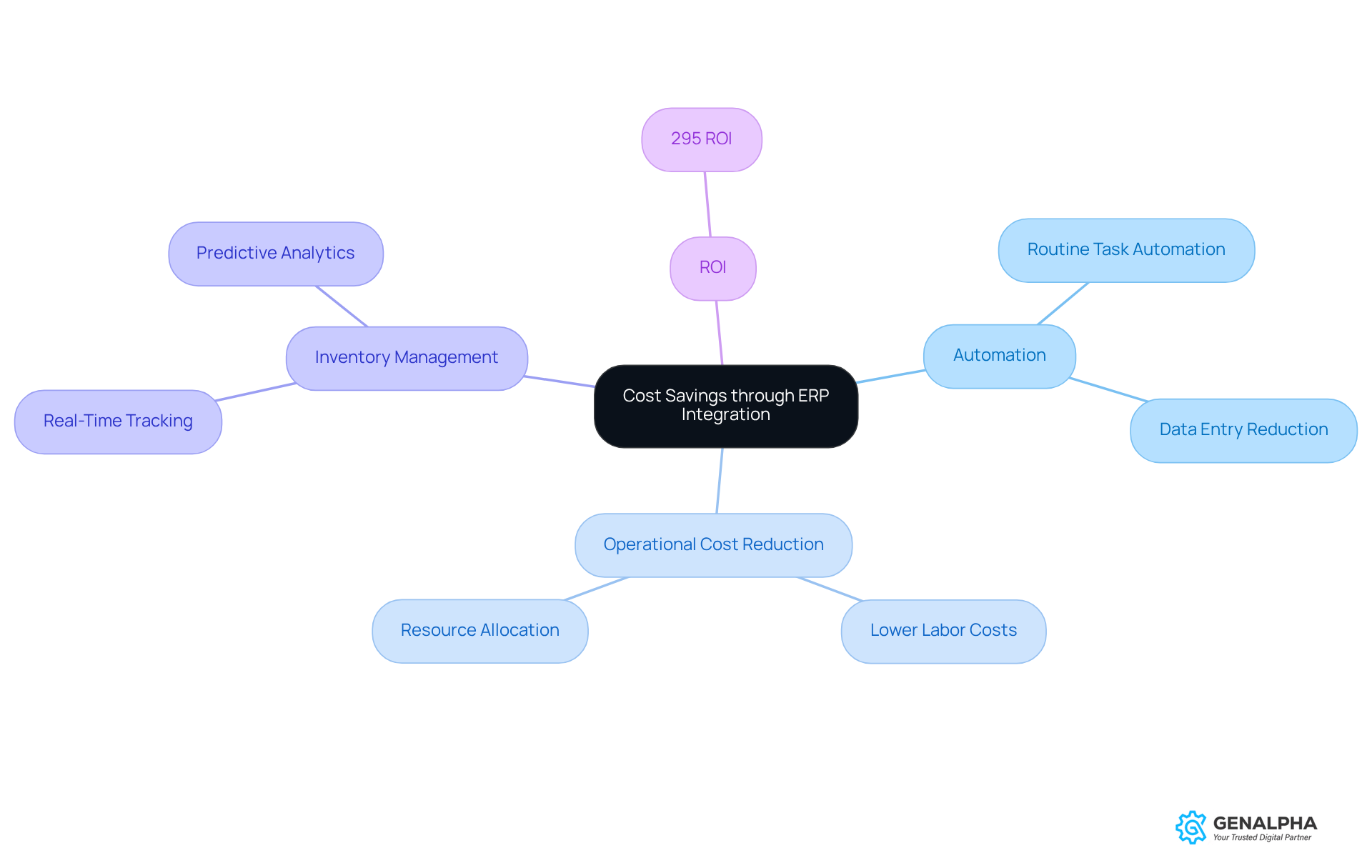
Scalability: Enable Growth and Adaptability for Manufacturers
The integration of B2B ecommerce ERP offers producers scalable solutions that grow with their business needs. Have you ever thought about how your business could adapt as you expand your product range or enter new markets? These interconnected systems handle higher transaction volumes and complexities with ease. This flexibility means producers can quickly respond to market demands without the hassle of extensive infrastructure changes, making transitions smoother and supporting ongoing growth.
Did you know that nearly 80% of B2B sales interactions are expected to happen through digital channels by 2025? This statistic highlights why it’s essential for manufacturers to embrace B2B ecommerce ERP as part of their integrated ERP solutions to stay competitive in today’s customer-driven digital commerce landscape. Take Robert Lee, for example, the largest independent distributor of plumbing products in the UK. They boosted their operational efficiency through ERP integration by streamlining their inventory management and order processing.
Industry leaders emphasize that adapting to market changes with robust B2B ecommerce ERP solutions isn’t just beneficial; it’s vital for long-term success in manufacturing. As one industry expert put it, 'Building a successful eCommerce business requires the right technology stack.' So, are you ready to explore how ERP integration can transform your business?
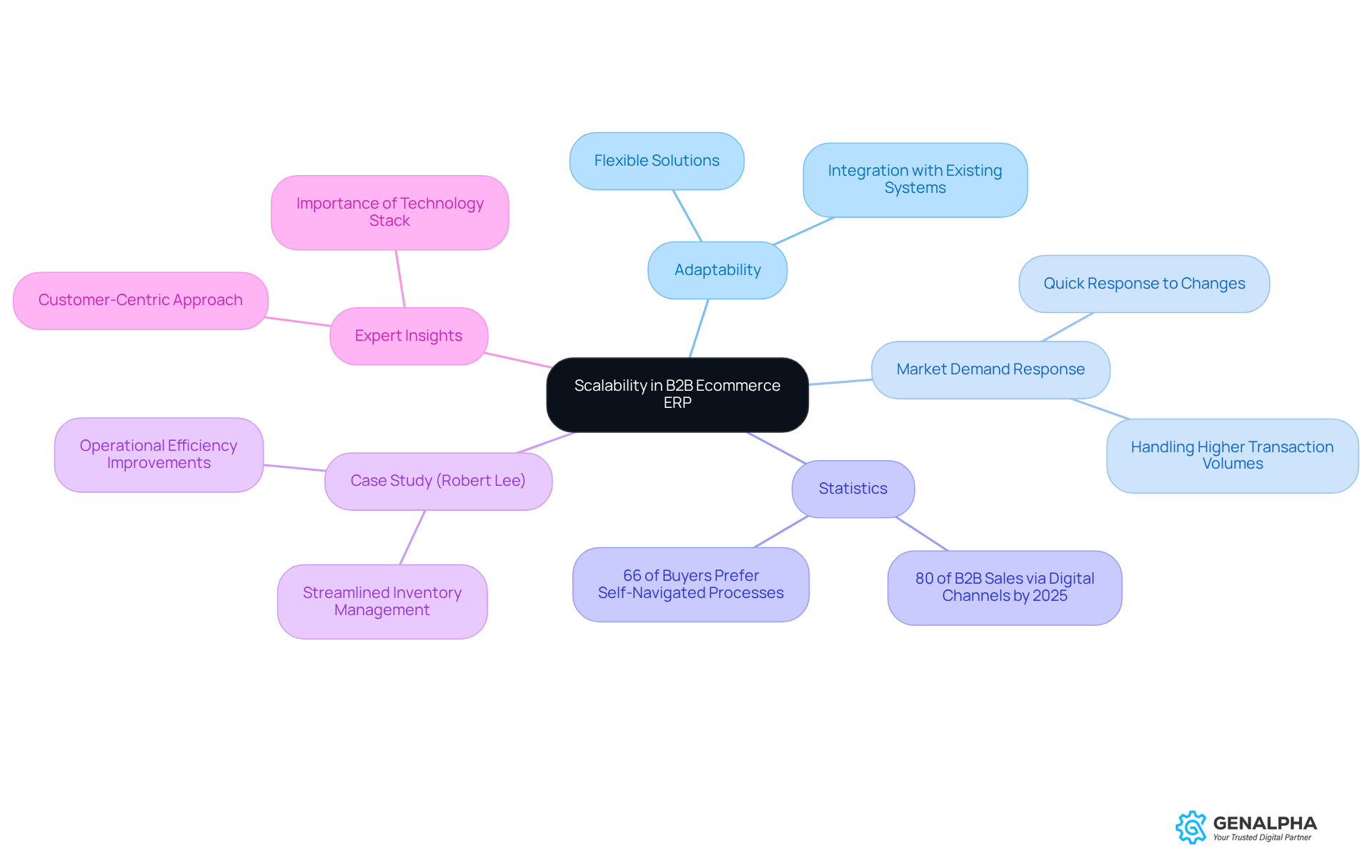
Improved Customer Experience: Foster Loyalty and Retention
Integrating B2B eCommerce ERP systems really boosts the user experience, ensuring smooth interactions across all touchpoints. Have you ever thought about how much easier it is when customers can access real-time product info, track orders, and receive personalized service? These elements are crucial for building loyalty. For instance, when clients can quickly check their order history and keep an eye on shipments, their satisfaction tends to soar, leading to better loyalty and retention rates.
Research from Deloitte shows that companies that excel in client experience see their revenue grow 80% faster than their competitors. That’s a big deal, especially for manufacturers looking to build long-lasting relationships with clients. Plus, effective real-time order tracking doesn’t just improve satisfaction; it also builds trust. Clients appreciate transparency and timely updates about their purchases.
In today’s competitive manufacturing landscape, smooth interactions are key. Did you know that 86% of purchasers are willing to pay more for a better experience? This really highlights the financial impact of enhancing user experience through integration. By focusing on personalized experiences and quick responses, producers can not only boost customer retention but also spark growth. So, what steps can you take today to enhance your client interactions?
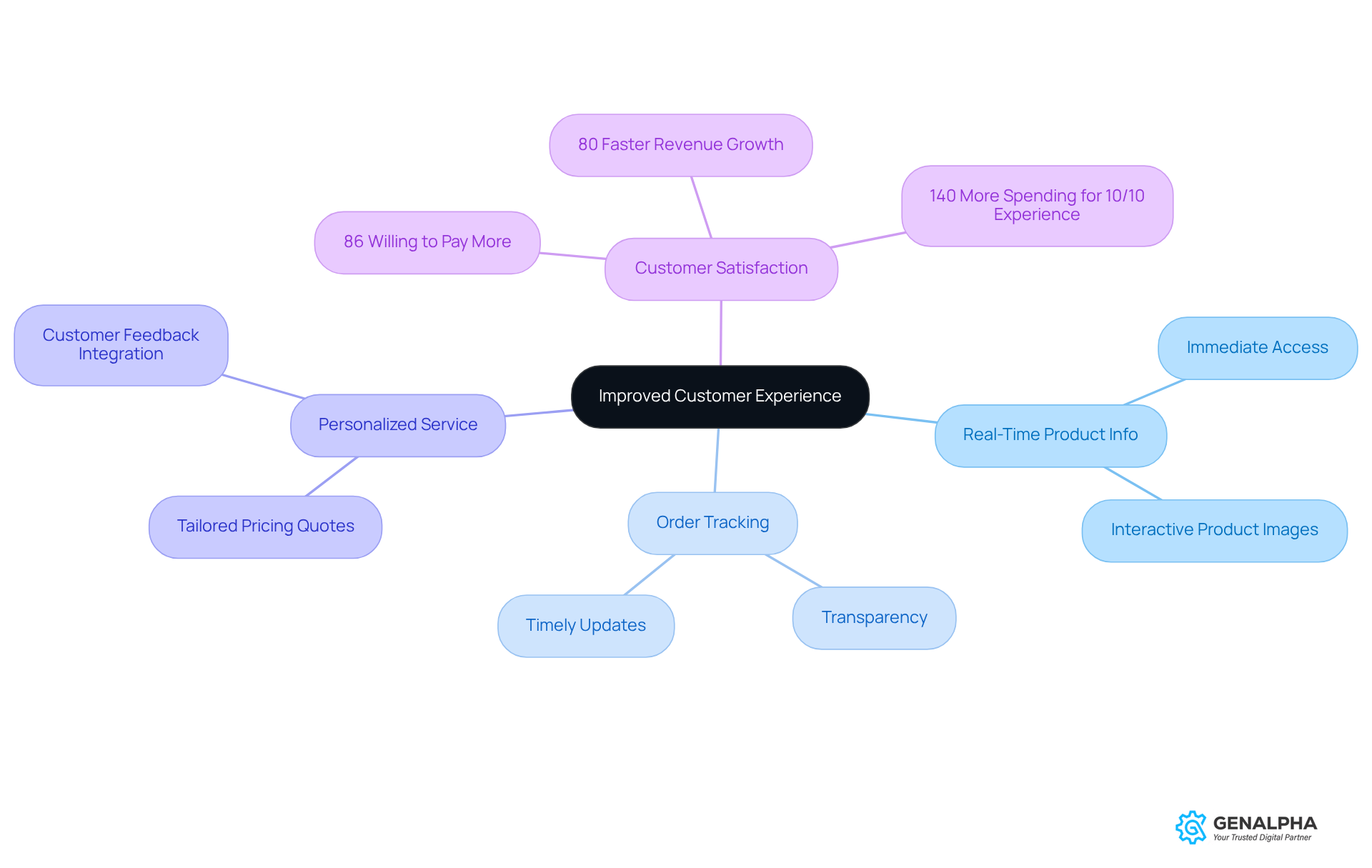
Process Automation: Reduce Errors and Increase Efficiency
Have you ever thought about how b2b ecommerce erp can transform manufacturing? By automating key processes like order processing, invoicing, and inventory management, manufacturers can really streamline their operations. This automation doesn’t just cut down on human errors; it also ensures that data stays accurate and consistent across all systems.
For example, consider automated order processing. It eliminates those pesky manual entry mistakes, which not only speeds up fulfillment times but also boosts customer satisfaction. In fact, did you know that automating 64% of manufacturing tasks could save billions of working hours? That’s a huge efficiency gain!
So, what does this mean for producers? By automating routine tasks, they can shift their focus to more strategic initiatives, ultimately driving growth and efficiency. A great case in point is a manufacturing facility that implemented automated storage and retrieval solutions. This not only reduced errors in selecting and storing products but also improved overall operational efficiency and employee safety.
As one expert put it, "By automating dangerous processes, you can keep your employees safer while reducing errors in manufacturing." This kind of advancement is crucial for manufacturers utilizing b2b ecommerce erp to stay competitive in today’s fast-paced market. So, are you ready to embrace automation and take your operations to the next level?
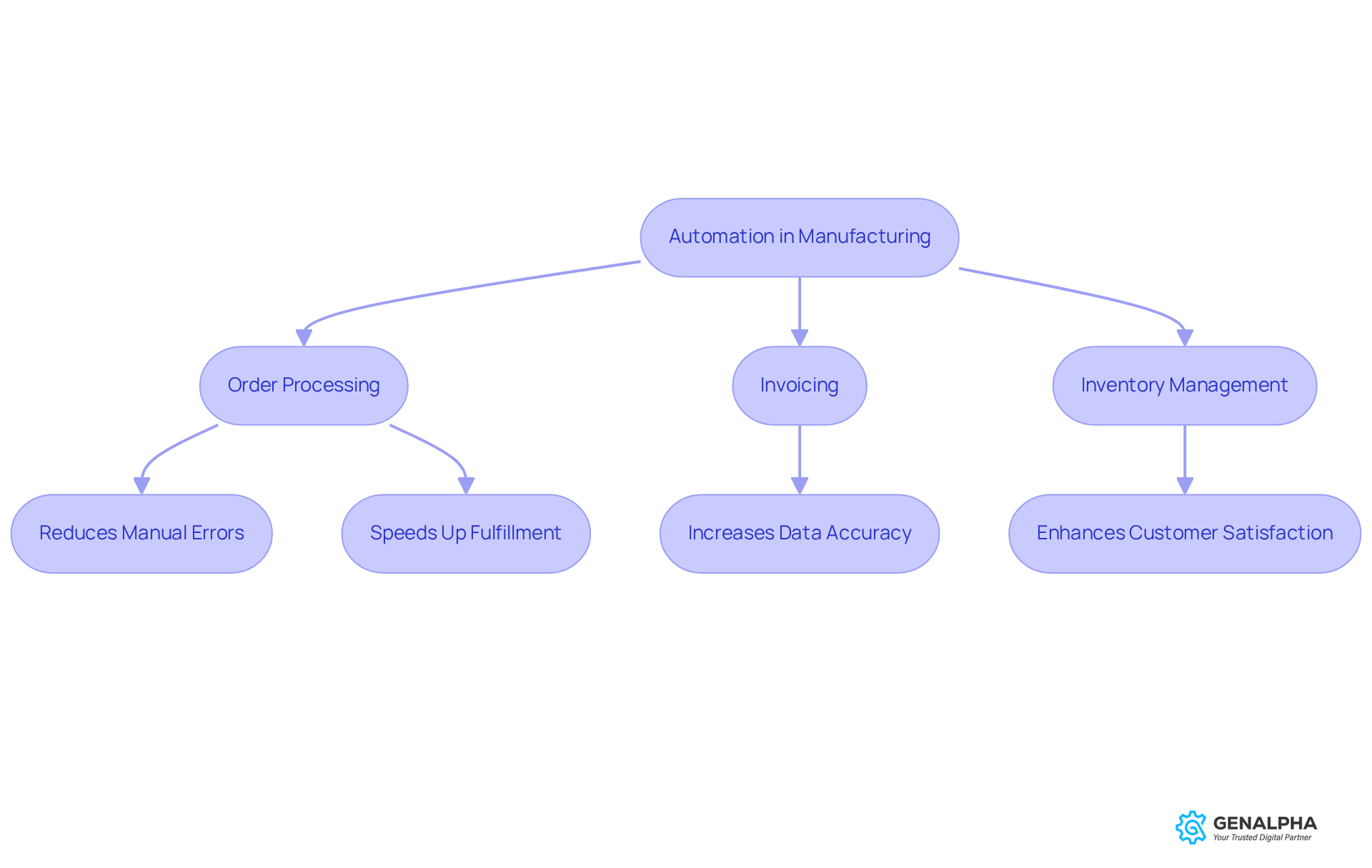
Compliance and Security: Safeguard Sensitive Data in ERP Integration
Integrating b2b ecommerce erp with solutions is a game changer for compliance and security. By centralizing data management and implementing solid protective measures, producers can keep sensitive client and operational information safe from breaches and unauthorized access. Think about it: features like data encryption, access controls, and regular audits make a real difference.
For example, ERP systems that use end-to-end encryption ensure that your data stays secure both during transmission and while it's stored. This is crucial for maintaining client trust. And here’s a thought—this commitment to security not only protects businesses from potential data breaches (which, by the way, cost an average of $4.88 million in 2024) but also builds trust with clients. When they feel secure, their loyalty grows, paving the way for long-term relationships.
So, by prioritizing these security measures, producers can navigate the complexities of compliance effectively while boosting their operational integrity. Isn’t it time to take action and enhance your security strategy?
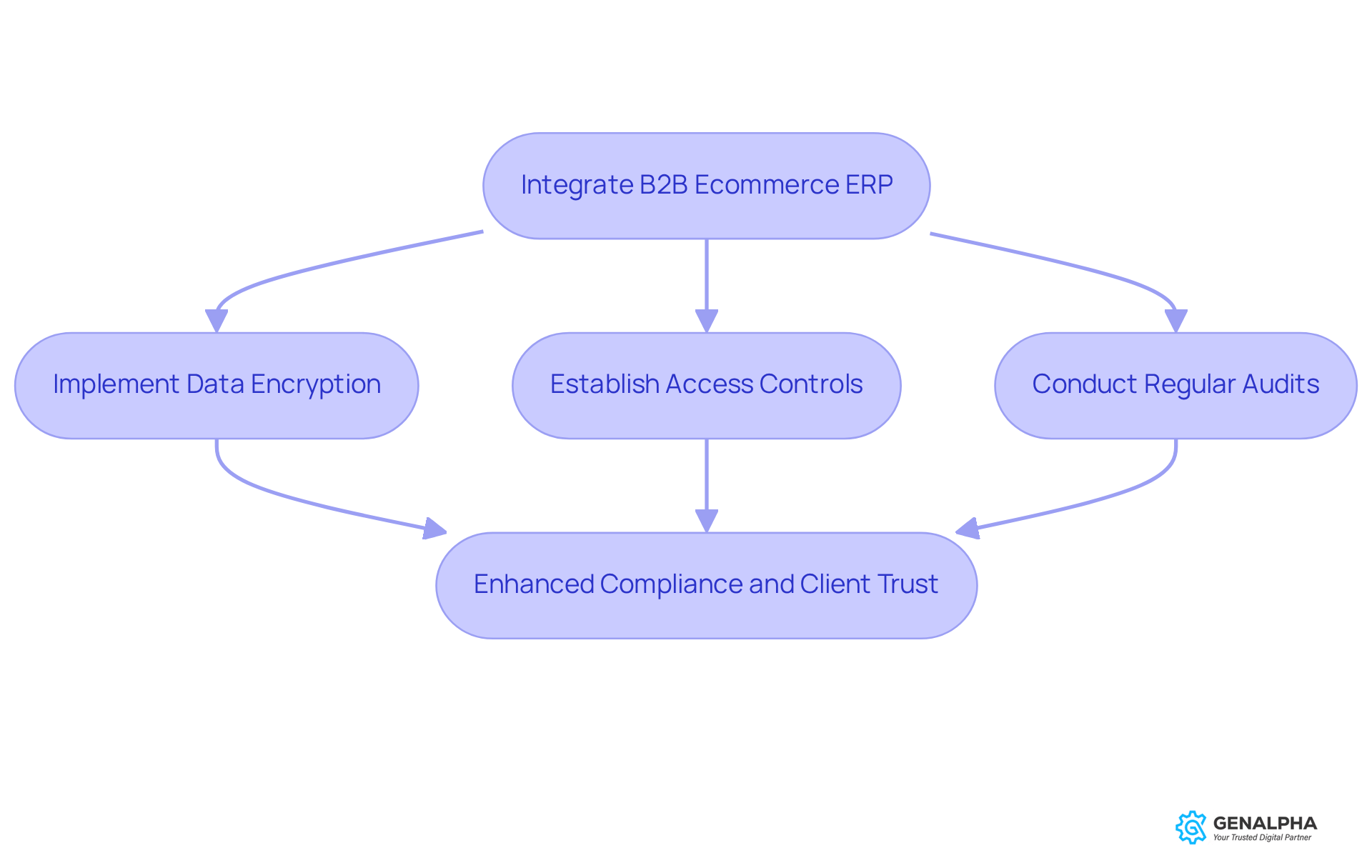
Integrated Sales and Marketing Strategies: Enhance Overall Business Performance
Have you ever thought about how integrating B2B ecommerce ERP systems can truly bring sales and marketing together? It’s all about creating a unified connection that helps manufacturers deliver a consistent message to their clients. When these teams share data, they can craft targeted campaigns that truly resonate with their audience. For instance, insights from buyer purchasing behaviors can significantly shape marketing strategies, leading to promotions that hit the mark and higher conversion rates.
This collaborative approach doesn’t just boost marketing effectiveness; it drives overall business performance and growth, especially when integrated with B2B ecommerce ERP. Companies that nail these integrated strategies often see big improvements in lead generation and customer engagement. And guess what? This all translates to higher sales conversions and sustained revenue growth.
As Dan Sondhelm points out, having an integrated strategy means better resource allocation and consistent messaging, which ultimately results in a greater return on investment (ROI). In fact, Salesloft has shown a whopping 236% ROI over three years for companies that embrace integrated sales and marketing efforts. That’s a clear win for collaboration! So, how can your company start leveraging these strategies for success?
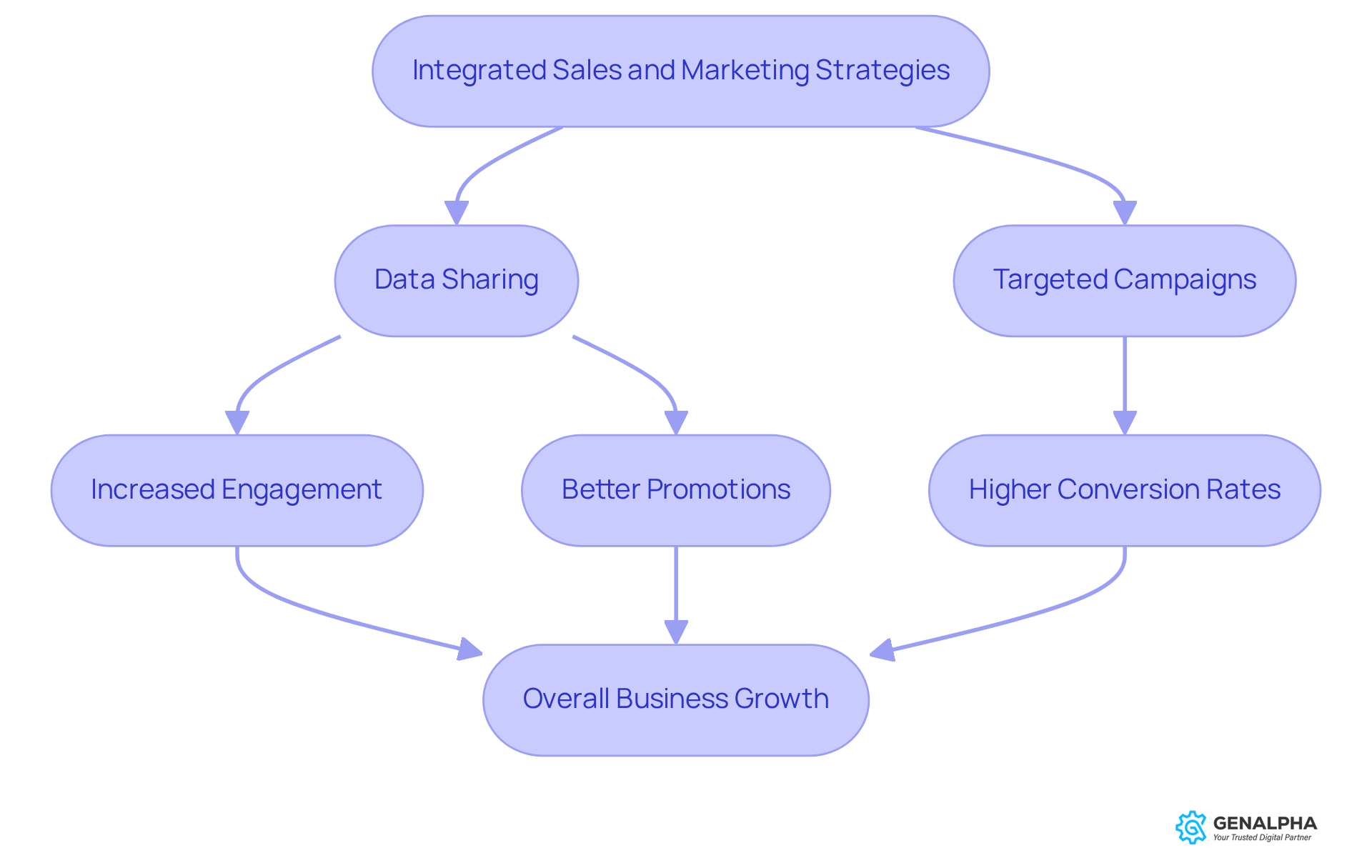
Conclusion
Integrating B2B eCommerce ERP systems presents a fantastic opportunity for equipment manufacturers to boost their operational efficiency and stay competitive. Imagine streamlining processes, automating tasks, and having real-time data at your fingertips—this allows businesses to respond quickly to market demands while significantly enhancing customer experiences and satisfaction.
Throughout this article, we’ve highlighted key benefits like improved order accuracy, better inventory management, and cost savings. By integrating these systems, manufacturers not only cut down on errors and operational costs but also gain the flexibility to scale and adapt, enabling them to thrive in a fast-paced environment. Plus, with a strong focus on compliance and security, sensitive data remains protected, reinforcing customer trust and loyalty.
As the manufacturing landscape evolves, embracing B2B eCommerce ERP solutions is essential for long-term success. Companies need to take proactive steps to leverage these technologies—not just to optimize operations but to enhance overall business performance. The potential for increased profitability and market expansion is huge, so it’s vital for manufacturers to act now and explore the advantages that ERP integration can bring to their operations. What are you waiting for? Let’s dive into the world of ERP and see how it can transform your business!
Frequently Asked Questions
What is the main focus of GenAlpha Technologies regarding B2B eCommerce ERP integration?
GenAlpha Technologies specializes in creating tailored solutions for B2B eCommerce ERP integration, aiming to help producers streamline operations, automate sales processes, improve inventory management, and enhance customer interactions.
What are the benefits of integrating ERP solutions with eCommerce platforms?
Companies that integrate ERP solutions with eCommerce platforms experience a 30% reduction in operational expenses and a 35% decrease in delays, leading to improved efficiency and responsiveness to market demands.
How does real-time data access benefit manufacturers?
Real-time data access enables manufacturers to make quick, informed decisions, adapt to market changes, manage supply chain issues, and adjust production schedules effectively, which boosts operational efficiency and customer satisfaction.
What percentage of producers consider real-time data vital for their operations?
74% of producers see real-time data as essential for their operations, providing them with a comprehensive view of production processes.
What impact does integrating B2B eCommerce ERP systems have on order accuracy?
Integrating B2B eCommerce ERP systems significantly enhances order accuracy by automating data entry and reducing manual processes, which minimizes errors in order fulfillment and improves customer trust and satisfaction.
How much can companies reduce their order processing time by implementing automated systems?
Companies that adopt automated systems can reduce their order processing time by up to two-thirds.
What challenges do producers face that B2B eCommerce ERP can help address?
Producers often face challenges such as limited inventory visibility and rising fulfillment costs, which B2B eCommerce ERP can address through automated solutions.
What is the expected outcome of embracing smart data strategies in manufacturing?
Companies that embrace smart data strategies can achieve immediate efficiency gains, improve profitability, and enhance competitiveness in the market.




